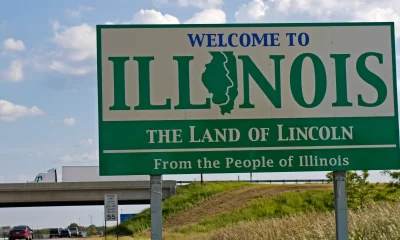Business
Texas Expands Restrictive Medical Pot Program To Combat Opioid Epidemic

But don’t expect any Texas stoners to celebrate.
Texas is broadening its restrictive medical cannabis program to include patients fighting chronic pain, the Houston Chronicle reports, in addition to expanding approved THC dosing limits from one percent to 10mg. While that may seem shockingly low to medical patients in states with more liberal cannabis laws, currently, Texas’s medical marijuana law is CBD-only, as it allows for only one percent of THC. The new law, which goes into effect on September 1, 2023, might not win the Lone Star state stoner points, but at the least, it’s a step in the right direction. The original bill tried to cap the prescribed THC dose to 5mg but then amended the bill to a volumetric dose limit of 10 milligrams.
Legal adult-use cannabis in Texas is non-existent, so forget about strolling into a dispensary to grab some dabs anytime soon. The state’s Compassionate-Use Program, or CUP, was initially passed in 2015, limiting medical use of less-than-one-percent cannabis to intractable epilepsy. The list of qualifying conditions was expanded in 2019 and again in 2021 by the Texas Legislature to include autism, cancer, multiple sclerosis, post-traumatic stress disorder, multiple sclerosis, and several others.
Now, Texas lawmakers drafted a bill that adds “a condition that causes chronic pain, for which a physician would otherwise prescribe an opioid” to the list. According to the CDC, 1 in 5 Americans lives with chronic pain. Per the newly passed Texas bill, the Department of State Health Services will be allowed to specify which “debilitating medical conditions” qualify for the program.
The bill, HB 1805l, was written by Republican Rep. Stephanie Klick and was approved by the House Public Health Committee with a 10-0 vote Monday, March 20. The passage of HB 1805l comes after further momentum from lawmakers in the state. Earlier in March, Texas lawmakers held a hearing on House Bill 218 from Democrat Rep. Joe Moody that, if passed, would lower the penalties for possession of cannabis and cannabis concentrates.
While Texas cannabis laws, in accordance with their other social policies, such as reproductive rights, are still highly regressive, this new bill does show that Texas is aware of the grave issue of opioid addiction and seeks to tackle it from a harm reduction perspective, by allowing chronic pain patients cannabis. According to the National Institutes of Health, more than 106,000 persons in the U.S. died from a drug-involved overdose in 2021, including illicit drugs and prescription opioids. According to The Texas Workforce Commission, there was an 80% increase in synthetic opioid-related deaths reported in Texas in 2021 compared to 2020. In addition, as Benzinga points out, a recent study shows that direct payments from opioid manufacturers to physicians have significantly decreased following the legalization of medical cannabis. And, as a reminder, even the DEA states that no deaths from cannabis overdose have occurred. While recreational cannabis is illegal in Texas, you can pick up some nasty (and fatal) synthetic THC options if you need a deadly reminder of the hypocrisy of strict marijuana laws.
While the cannabis laws in Texas are highly restricted, they do not necessarily match the state’s citizens’ views on the plant. According to a study at the University of Houston, which conducted an online survey of 1,200 Texan adults 18 and older, 4 out of 5 adults said they would support an expanded medical marijuana program. Those surveyed also said they favor decriminalizing marijuana possession, and additionally, two-thirds of them said they would support legalizing recreational adult use. So, while the newly passed bill is a win for chronic pain patients, the state’s lawmakers have much work ahead of them if they wish to address their voter’s needs accurately.
Source: https://hightimes.com/news/texas-expands-restrictive-medical-pot-program-to-combat-opioid-epidemic/
Business
New Mexico cannabis operator fined, loses license for alleged BioTrack fraud

New Mexico regulators fined a cannabis operator nearly $300,000 and revoked its license after the company allegedly created fake reports in the state’s traceability software.
The New Mexico Cannabis Control Division (CCD) accused marijuana manufacturer and retailer Golden Roots of 11 violations, according to Albuquerque Business First.
Golden Roots operates the The Cannabis Revolution Dispensary.
The majority of the violations are related to the Albuquerque company’s improper use of BioTrack, which has been New Mexico’s track-and-trace vendor since 2015.
The CCD alleges Golden Roots reported marijuana production only two months after it had received its vertically integrated license, according to Albuquerque Business First.
Because cannabis takes longer than two months to be cultivated, the CCD was suspicious of the report.
After inspecting the company’s premises, the CCD alleged Golden Roots reported cultivation, transportation and sales in BioTrack but wasn’t able to provide officers who inspected the site evidence that the operator was cultivating cannabis.
In April, the CCD revoked Golden Roots’ license and issued a $10,000 fine, according to the news outlet.
The company requested a hearing, which the regulator scheduled for Sept. 1.
At the hearing, the CCD testified that the company’s dried-cannabis weights in BioTrack were suspicious because they didn’t seem to accurately reflect how much weight marijuana loses as it dries.
Company employees also poorly accounted for why they were making adjustments in the system of up to 24 pounds of cannabis, making comments such as “bad” or “mistake” in the software, Albuquerque Business First reported.
Golden Roots was fined $298,972.05 – the amount regulators allege the company made selling products that weren’t properly accounted for in BioTrack.
The CCD has been cracking down on cannabis operators accused of selling products procured from out-of-state or not grown legally:
- Regulators alleged in August that Albuquerque dispensary Sawmill Sweet Leaf sold out-of-state products and didn’t have a license for extraction.
- Paradise Exotics Distro lost its license in July after regulators alleged the company sold products made in California.
Golden Roots was the first alleged rulebreaker in New Mexico to be asked to pay a large fine.
Source: https://mjbizdaily.com/new-mexico-cannabis-operator-fined-loses-license-for-alleged-biotrack-fraud/
Business
Marijuana companies suing US attorney general in federal prohibition challenge

Four marijuana companies, including a multistate operator, have filed a lawsuit against U.S. Attorney General Merrick Garland in which they allege the federal MJ prohibition under the Controlled Substances Act is no longer constitutional.
According to the complaint, filed Thursday in U.S. District Court in Massachusetts, retailer Canna Provisions, Treevit delivery service CEO Gyasi Sellers, cultivator Wiseacre Farm and MSO Verano Holdings Corp. are all harmed by “the federal government’s unconstitutional ban on cultivating, manufacturing, distributing, or possessing intrastate marijuana.”
Verano is headquartered in Chicago but has operations in Massachusetts; the other three operators are based in Massachusetts.
The lawsuit seeks a ruling that the “Controlled Substances Act is unconstitutional as applied to the intrastate cultivation, manufacture, possession, and distribution of marijuana pursuant to state law.”
The companies want the case to go before the U.S. Supreme Court.
They hired prominent law firm Boies Schiller Flexner to represent them.
The New York-based firm’s principal is David Boies, whose former clients include Microsoft, former presidential candidate Al Gore and Elizabeth Holmes’ disgraced startup Theranos.
Similar challenges to the federal Controlled Substances Act (CSA) have failed.
One such challenge led to a landmark Supreme Court decision in 2005.
In Gonzalez vs. Raich, the highest court in the United States ruled in a 6-3 decision that the commerce clause of the U.S. Constitution gave Congress the power to outlaw marijuana federally, even though state laws allow the cultivation and sale of cannabis.
In the 18 years since that ruling, 23 states and the District of Columbia have legalized adult-use marijuana and the federal government has allowed a multibillion-dollar cannabis industry to thrive.
Since both Congress and the U.S. Department of Justice, currently headed by Garland, have declined to intervene in state-licensed marijuana markets, the key facts that led to the Supreme Court’s 2005 ruling “no longer apply,” Boies said in a statement Thursday.
“The Supreme Court has since made clear that the federal government lacks the authority to regulate purely intrastate commerce,” Boies said.
“Moreover, the facts on which those precedents are based are no longer true.”
Verano President Darren Weiss said in a statement the company is “prepared to bring this case all the way to the Supreme Court in order to align federal law with how Congress has acted for years.”
While the Biden administration’s push to reschedule marijuana would help solve marijuana operators’ federal tax woes, neither rescheduling nor modest Congressional reforms such as the SAFER Banking Act “solve the fundamental issue,” Weiss added.
“The application of the CSA to lawful state-run cannabis business is an unconstitutional overreach on state sovereignty that has led to decades of harm, failed businesses, lost jobs, and unsafe working conditions.”
Business
Alabama to make another attempt Dec. 1 to award medical cannabis licenses

Alabama regulators are targeting Dec. 1 to award the first batch of medical cannabis business licenses after the agency’s first two attempts were scrapped because of scoring errors and litigation.
The first licenses will be awarded to individual cultivators, delivery providers, processors, dispensaries and state testing labs, according to the Alabama Medical Cannabis Commission (AMCC).
Then, on Dec. 12, the AMCC will award licenses for vertically integrated operations, a designation set primarily for multistate operators.
Licenses are expected to be handed out 28 days after they have been awarded, so MMJ production could begin in early January, according to the Alabama Daily News.
That means MMJ products could be available for patients around early March, an AMCC spokesperson told the media outlet.
Regulators initially awarded 21 business licenses in June, only to void them after applicants alleged inconsistencies with how the applications were scored.
Then, in August, the state awarded 24 different licenses – 19 went to June recipients – only to reverse themselves again and scratch those licenses after spurned applicants filed lawsuits.
A state judge dismissed a lawsuit filed by Chicago-based MSO Verano Holdings Corp., but another lawsuit is pending.
Source: https://mjbizdaily.com/alabama-plans-to-award-medical-cannabis-licenses-dec-1/
-

 Business2 years ago
Business2 years agoPot Odor Does Not Justify Probable Cause for Vehicle Searches, Minnesota Court Affirms
-

 Business2 years ago
Business2 years agoNew Mexico cannabis operator fined, loses license for alleged BioTrack fraud
-

 Business2 years ago
Business2 years agoAlabama to make another attempt Dec. 1 to award medical cannabis licenses
-

 Business2 years ago
Business2 years agoWashington State Pays Out $9.4 Million in Refunds Relating to Drug Convictions
-

 Business2 years ago
Business2 years agoMarijuana companies suing US attorney general in federal prohibition challenge
-

 Business2 years ago
Business2 years agoLegal Marijuana Handed A Nothing Burger From NY State
-

 Business2 years ago
Business2 years agoCan Cannabis Help Seasonal Depression
-

 Blogs2 years ago
Blogs2 years agoCannabis Art Is Flourishing On Etsy











